

Brain Fog and Brain Fatigue. Leaky Blood-Brain Barrier. Alzheimer's Disease and Dementia. Gluten Sensitivity and Brain Health. Red and NIR Light Therapy for the Brain. Mental Health. Migraines. Neurological Disorders. Parkinson's Disease.
Glymphatic Drainage (Brain Drain) The Brain and Digital Addiction. Nutrition and Brain Health. Brain Health, Mental Health and the Gut Microbiome. Exercise and the Brain. Sleep and the Brain. Brain Health Daily. Optimal Living Dynamics.
Dynamic Neural Retraining System - Treatment for Chronic Illness. BioFoundations. Norman Doidge, MD. UTDallas Center for Brain Health Brain Performance Institute - Center for BrainHealth. Evolutionary Psychiatry. The most important lesson from 83,000 brain scans: Daniel Amen at TEDxOrangeCoast. The Woman Who Changed Her Brain: Barbara Arrowsmith-Young at TEDxToronto. QUANTITATIVE MEDICINE. Marathon Drugs Increases Price 70-Fold – 2/10/17 More predation by pharma.
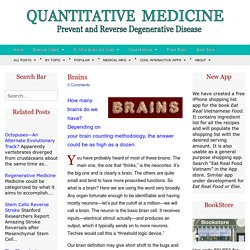
Marathon has gotten a decades old muscular dystrophy drug, deflazacort, approved and is charging $89,000 a year for it. It’s price in Europe is under $1500/year. Where are the free market forces? Why aren’t our elected officials protecting us from this egregious practice? Lowest Stroke Rates in Older Baby Boomers; Younger People Rising– 9/12/16 reports the American Heart Association, here. Sugar Lobby Promotes Sugar– 11/13/16 Surreal. Zika Breakthrough– 8/30/16 Reported here and elsewhere, two existing (already approved) drugs appear to be effective against Zika. AHA Limits Added Sugar– 8/17/16 A sensible recommendation from the American Heart Association limits sugar for children aged 2-18 to fewer than 6 teaspoons a day. Calcium Supplements Linked to Dementia– 8/17/16 A report in the journal Neurology, here, links calcium supplements to dementia in some groups of women.
The medications that change who we are - BBC Future. The matter takes on a whole new urgency, when you consider that some personality changes can be dramatic.
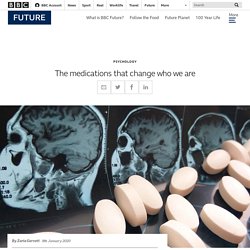
There’s solid evidence that the drug L-dopa, which is used to treat Parkinson’s disease, increases the risk of Impulse Control Disorders (ICDs) – a group of problems that make it more difficult to resist temptations and urges. Consequently, the drug can have life-ruining consequences, as some patients suddenly start taking more risks, becoming pathological gamblers, excessive shoppers, and sex pests. In 2009, a drug with similar properties hit the headlines, after a man with Parkinson’s committed a £45,000 ($60,000) ticket scam. He blamed it on his medication, claiming that it had completely changed his personality. Experts agree that L-dopa is the most effective treatment for many of the symptoms of Parkinson’s disease, and it’s prescribed to thousands of people in the US every year. Myths about the Brain. Have you given any thought to the colour of your brain?

Maybe not, unless you work in the medical field. We have all colours of the rainbow in our bodies in the form of blood, tissue, bone and other fluids. Scientist explores the '7th sense' — the link between the immune system and the brain - Daily Press. Blood Viscosity: The Role of Blood Flow in Cognitive Function. In April 2012, the World Health Organization published a new report on the alarming worldwide trends in dementia. The report estimated that in 2010, approximately 35.6 million people were living with dementia. By 2030 that number is set to double to 65.7 million. By 2050, the figure is expected to triple to 115.4 million, according to Dementia: A Public Health Priority (WHO Press, 2012). Immune activation in brain aging and neurodegeneration: too much or too little? 13 Scientific Reasons Explaining Why You Crave Infographics. Women’s Brains Are More Active Than Men.
In one of the largest functional brain imaging studies conducted specific brain differences between men and women have been identified by the Amen Clinics using images provided by 9 clinics as published in the Journal of Alzheimer’s Disease. 46, 034 brain single photon emission computed tomography images provided by 9 clinics were analyzed quantifying the differences between the male and female brain.

The differences identified are important for understanding the gender based risks for brain disorders such as Alzheimer’s disease. Using advanced tools such as single photon emission computed tomography images is essential to developing precision brain medicines and treatments in the future. Choose These Tunes. Listening to classical music prompts biological changes in the brain that may promote learning and memory.

Listening to music represents a complex cognitive function of the human brain, which is known to induce several neuronal and physiological changes. Chakravarthi Kanduri, from the University of Helsinki (Finland), and colleagues investigated how listening to classical music affected the gene expression profiles of both musically experienced and inexperienced participants.
All the participants listened to W.A. Mozart's violin concert Nr 3, G-major, K.216 that lasts 20 minutes. The researchers observed that listening to music enhanced the activity of genes involved in dopamine secretion and transport, synaptic function, learning and memory. Basal Ganglia: Function & 15 Disorders Linked to It. Brain-Training Games Don't Actually Make You Smarter. A decade ago, a young Swedish researcher named Torkel Klingberg made a spectacular discovery.

He gave a group of children computer games designed to boost their memory, and, after weeks of play, the kids showed improvements not only in memory but in overall intellectual ability. Spending hours memorizing strings of digits and patterns of circles on a four-by-four grid had made the children smarter. The finding countered decades of psychological research that suggested training in one area (e.g., recalling numbers) could not bring benefits in other, unrelated areas (e.g., reasoning). The Klingberg experiment also hinted that intelligence, which psychologists considered essentially fixed, might be more mutable: that it was less like eye color and more like a muscle.
It seemed like a breakthrough, offering new approaches to education and help for people with A.D.H.D., traumatic brain injuries, and other ailments. The responsibility is so heavy because the needs are so great. Using Neurobics to Improve Your Brain - DrJockers.com. Using Neurobics to Improve Your Brain Neurobics is a term that was described by the late neurobiologist Lawrence Katz and Manning Rubin in their book, Keep Your Brain Alive.
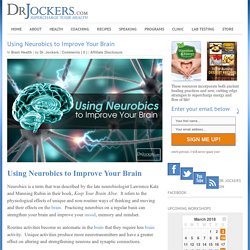
Health Issues Could Occur After Exposure to Mold. Highly Creative Brains are Better Connected. New study reveals that creative people have more connections between the right and left hemispheres of their brains.
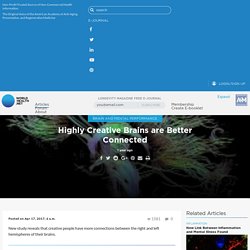
Recent scientific research has found those who lack creativity have a different brain structure than those who are highly creative. Though plenty of people like to state that everyone has the potential to be artist, the truth is that creativity is predominantly determined by brain connectivity. It is not possible for one to simply "tap into" the right side of his brain to become creative. The connectivity of the brain's right hemisphere to the left hemisphere is what determines an individual's level of creativity. Are You Causing Brain Inflammation With Your Lifestyle? Are You Causing Brain Inflammation?
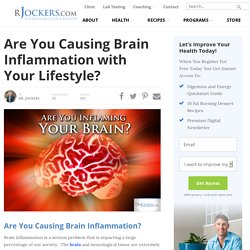
Brain inflammation is a serious problem that is impacting a large percentage of our society. The brain and neurological tissue are extremely sensitive regions of the body that are highly susceptible to damage. One of the ways that our body protects itself from the threat of infection is through an immune process called inflammation. When inflammation effects the brain it can do some serious damage. Nature's Soothing Soundtrack Validated. For the first time, research shows how the sounds of nature promote relaxation and a sense of well-being.

New research from the Brighton and Sussex Medical School (BSMS) of the University of Sussex reports that a long walk in the woods or on the beach, sitting by a burbling brook, or even the sound of wind or birds in the trees can physically change our bodily systems and mind and lead to relaxation and well-being. 'Green' environments and naturalistic sounds have frequently been linked to feelings that bring about a relaxing atmosphere; but, until this research, there was no scientific consensus as to how this comes about. Dr. Cassandra Gould van Praag, the lead author, stated that we now have evidence from the body and the brain that helps us to understand this effect.
This is your brain on meditation: Brain processes more thoughts, feelings during meditation, study shows. Meditation is more than just a way to calm our thoughts and lower stress levels: our brain processes more thoughts and feelings during meditation than when you are simply relaxing, a coalition of researchers from Norway and Australia has found. Mindfulness. Zen. Acem. Meditation drumming. Chakra. Is Your Brain Making Enough GABA? - DrJockers.com. Is Your Brain Making Enough GABA? GABA (Gamma-AminoButyric Acid) is an inhibitory neurotransmitter that has a calming and relaxing effect in the brain.
It acts like the brakes in a car, to where it slows down and/or stops brain activity on an as-needed basis to help us function better. When we are low in this neurotransmitter, our brain continues to hit the gas, overstimulating us with activity. Do You Have Low Serotonin Levels? - DrJockers.com. Do You Have Low Serotonin Levels? It is all too common in our society to deal with a serotonin deficiency. Serotonin helps us to feel good. It has been called by many the “happy molecule” for its role in helping to create a positive mood. This article will help you discover if you have lower serotonin levels and natural strategies to boost your serotonin levels naturally. Serotonin is also an inhibitory neurotransmitter that helps us with impulse control and pain relief.
Many experts consider serotonin more of a hormone than a neurotransmitter because its effects impact the entire body. In addition, low serotonin can increase the severity of other health problems such as migraine headaches, asthma and fibromyalgia (5, 6, 7). Human Brain Has A Direct Link To The Immune System After All : Shots - Health News. Alzheimer's disease causes atrophy of brain tissue. The discovery that lymph vessels near the brain's surface help remove waste suggests glitches in the lymph system might be involved in Alzheimer's and a variety of other brain diseases.
Alfred Pasieka/Science Source hide caption toggle caption Alfred Pasieka/Science Source. What is a Creative Person? Stopping All Exercise and Blood Flow In the Brain – Lacto Bacto. Fat-Burning Brain Hormone Discovery. Researchers have found a brain hormone that appears to specifically and selectively stimulate fat metabolism in the gut. It appears as though one of the brain's natural hormones spurs the burning of fat within the gut. This conclusion was reached by Scripps Research Institute (TSRI) biologists who relied on animal models for their studies. Evolutionary Psychiatry: Anger and Homocysteine (A Folate Cycle Ditty)
Happy Friday! Longevity Hormone Enhances Cognition. Klotho, the life extension protein, shows promising results in treating neurodegenerative diseases UC San Francisco scientists have determined that administering a component of the klotho protein to mice at varying ages quickly boosts mental and physical performance. This finding also proved true for impaired mice. Prior studies showed associations between high klotho levels and improved cognition, yet mice genetically designed to generate high klotho levels were used for those studies. Here’s What Clutter Does to Your Brain (and How to Fix It) Systems analysis points to links between Toxoplasma infection and common brain diseases. Autism, schizophrenia, bipolar disorder share molecular traits, study finds. Ability to Balance On One Leg and Brain Health. View Brain-Training Games As Fun and Nothing More. Evolutionary Psychiatry: ADHD and Mom's Serotonin Deficiency.
A quickie post today on this study from October's Archives of General Psychiatry, "Attention-Deficit/Hyperactivity Disorder Symptoms in Offspring of Mothers With Impaired Serotonin Production. " If you haven't noticed, I like to be somewhat hardcore about the biology of what is going on. I use psychology all the time in my work, but psychology takes so much explaining that I don't write about it much. Also, there's a whole vocabulary of psychology that has to be learned before it is easy to explain.
Though I do end up explaining psychology to people all the time, in appointments. But usually I have a frame of reference (something happening in a patient's life) to hang the psychology on. Speaking of DNA, each of us have certain genes for our serotonin machinery. To make serotonin from tryptophan, we need a couple of enzymes. Could this hormone rejuvenate memory? Updated brain cell map connects various brain diseases to specific cell types. What You Need to Know About Myelin and the Top 12 Ways to Support Your Brain. New antibodies target protein structures common to several neurological diseases. Could this protein hold the key to memory? Evolutionary Psychiatry: ADHD and Obesity. Disease-busting 'recycling bins' in our cells now better understood. 6 Natural Ways to Boost Hypothalamus Function.
The hypothalamus is an essential part of the human brain and is often considered the “control center” for most hormones. Its working relationship with the pituitary gland as well as the adrenal glands affects our nervous systems as well as our endocrine systems. But what does the hypothalamus do exactly? For starters, it plays a part in our calorie intake, weight regulation and body heat.
I’m sure you’re starting to get the picture that, even if you weren’t already familiar with hypothalamus function, it clearly is important to human existence. The hypothalamus is located deep within the brain, just above the base of the skull. Recent research even shows that many aspects of aging are controlled by the hypothalamus.
Cerebral (Brain) Atrophy and Shrinkage. The term cerebral means brain and atrophy means loss of cells or shrinkage. Evolutionary Psychiatry: Brain Shrinkage and B Vitamins. As we discussed before, humans are rather unique among primates in that our brains appear to shrink as we age. When I first posted the article, Steve Parker, M.D.* noted that there was a recent article on PLOS1 about B vitamins decreasing brain shrinkage, so I thought I would investigate the matter further. Air Pollution May Shrink the Aging Brain. Low Blood Pressure Linked with Brain Atrophy. Recognizing Subtle Signs of Early Stage Neurodegeneration.
Is Neuro-Regeneration a Reality? The potential of epigenetic therapies in neurodegenerative diseases. - PubMed - NCBI. New mechanisms found of cell death in neurodegenerative disorders. Deadly combination in neurodegenerative diseases revealed.